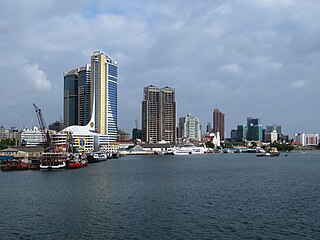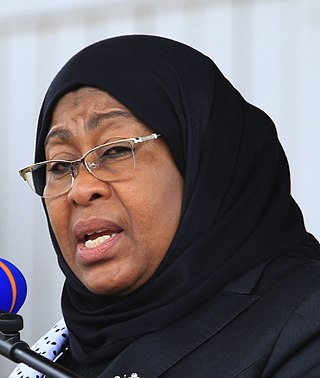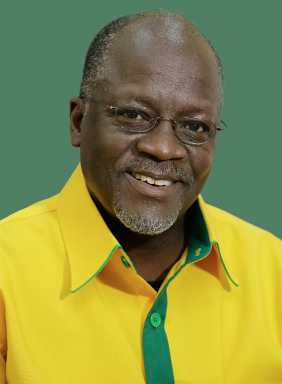Related Research Articles

Dar es Salaam or commonly known as Dar, is the largest city and financial hub of Tanzania. It is also the capital of Dar es Salaam Region. With a population of over six million people, Dar is the largest city in East Africa and the seventh-largest in Africa. Located on the Swahili coast, Dar es Salaam is an important economic centre and is one of the fastest-growing cities in the world.

Tanzania, officially the United Republic of Tanzania, is a country in East Africa within the African Great Lakes region. It borders Uganda to the north; Kenya to the northeast; the Indian Ocean to the east; Mozambique and Malawi to the south; Zambia to the southwest; and Rwanda, Burundi, and the Democratic Republic of the Congo to the west. Mount Kilimanjaro, Africa's highest mountain, is in northeastern Tanzania. According to the 2022 national census, Tanzania has a population of nearly 62 million, making it the fifth largest in Africa.

The economy of Tanzania is a lower-middle income economy that is overwhelmingly dependent on agriculture. Tanzania's economy has been transitioning from a command economy to a market economy since 1985. Although total GDP has increased since these reforms began, GDP per capita dropped sharply at first, and only exceeded the pre-transition figure in around 2007.

Zanzibar is an insular semi-autonomous province which united with Tanganyika in 1964 to form the United Republic of Tanzania. It is an archipelago in the Indian Ocean, 25–50 km (16–31 mi) off the coast of the African mainland, and consists of many small islands and two large ones: Unguja and Pemba Island. The capital is Zanzibar City, located on the island of Unguja. Its historic centre, Stone Town, is a World Heritage Site.

Dodoma, officially Dodoma City, is the national capital of Tanzania and the capital of the Dodoma Region, with a population of 410,956. In 1974, the Tanzanian government announced that the capital would be moved to Dodoma for social and economic reasons and to centralise the capital within the country. It became the official capital in 1996. Much of the initial design did not come to fruition for a long time. As a result, Dar es Salaam remains the commercial capital of Tanzania and still retains the state house Ikulu, and a large number of government functions.

The President of the United Republic of Tanzania is the head of state and head of government of the United Republic of Tanzania. The President leads the executive branch of the Government of Tanzania and is the commander-in-chief of the Tanzania People's Defence Force. The President serves a term of five years. Since 1992, they are limited to two terms, whether successive or separated.
Air Tanzania Company Limited (ATCL) (Swahili: Kampuni ya Ndege ya Tanzania) is the flag carrier airline of Tanzania. It is based in Dar es Salaam, with its hub at Julius Nyerere International Airport.

Tanzania is administratively divided into thirty-one regions.
An unclassified language is a language whose genetic affiliation to other languages has not been established. Languages can be unclassified for a variety of reasons, mostly due to a lack of reliable data but sometimes due to the confounding influence of language contact, if different layers of its vocabulary or morphology point in different directions and it is not clear which represents the ancestral form of the language. Some poorly known extinct languages, such as Gutian and Cacán, are simply unclassifiable, and it is unlikely the situation will ever change.

The Tanzania national football team represents Tanzania in men's international football and is controlled by the Tanzania Football Federation, the governing body for football in Tanzania, Tanzania's home ground is Benjamin Mkapa National Stadium in Dar-es-Salaam and their head coach is Adel Amrouche from Algeria. They are colloquially known as the Taifa Stars. Tanzania has never qualified for the FIFA World Cup. Before uniting with Zanzibar, the team played as the Tanganyika national football team, The team represents both FIFA and Confederation of African Football (CAF). Tanzania has qualified for 4 World cups
As of 2021,there are 31 regions of Tanzania which are divided into 184 districts.

The National Assembly of Tanzania and the President of Tanzania of the United Republic make up the Parliament of Tanzania. The current Speaker of the National Assembly is Tulia Ackson, who presides over a unicameral assembly of 393 members.

The Uganda–Tanzania War, known in Tanzania as the Kagera War and in Uganda as the 1979 Liberation War, was fought between Uganda and Tanzania from October 1978 until June 1979 and led to the overthrow of Ugandan President Idi Amin. The war was preceded by a deterioration of relations between Uganda and Tanzania following Amin's 1971 overthrow of President Milton Obote, who was close to the President of Tanzania, Julius Nyerere. Over the following years, Amin's regime was destabilised by violent purges, economic problems, and dissatisfaction in the Uganda Army.
The Ngindo are an ethnic and linguistic group based in southern Pwani Region, eastern Ruvuma Region, southern Morogoro Region and northern Lindi Region means in current area includes Liwale and Kilwa districts in current Tanzania or former Tanganyika, who speak the Ngindo and Ndendeule languages. In 1987 the Ngindo population was estimated to number 220,000 Prominent Ngindo people include. Saidi Alli Amanzi former District Commissioner of Masasi, Nyamagana, Morogoro and Singida from 2006 to 2016, Poet Amir Abdallah Sudi 'Andanenga' whose nickname Andanenga derives from two Ngindo words where anda means like and nenga means right me or me, therefore better translated as like me and some others. .
The Rufiji–Ruvuma languages are a group of Bantu languages established by Gloria Waite (1979) and subsequent researchers: N10, P10, P20.
Ndendeule is a Bantu language of Tanzania. Speakers are mostly monolingual.
Nindi is a minor Bantu language of Tanzania. Classified as Bantu N.10 by Guthrie and said to be close to Ndendeule, it is presumably one of the Rufiji–Ruvuma languages with the rest of the N.10 group.

Samia Suluhu Hassan is a Tanzanian politician who has been serving since 19 March 2021 as the sixth and first female president of Tanzania. She is a member of the ruling Chama Cha Mapinduzi (CCM) party and the third female head of government of an East African Community (EAC) country. Upon the death in office of President John Magufuli, she was sworn in as president.

John Pombe Joseph Magufuli was the fifth president of Tanzania, serving from 2015 until his death in 2021. He served as Minister of Works, Transport and Communications from 2000 to 2005 and 2010 to 2015 and was chairman of the Southern African Development Community from 2019 to 2020.
The COVID-19 pandemic in Tanzania is part of the ongoing worldwide pandemic of coronavirus disease 2019 caused by severe acute respiratory syndrome coronavirus 2. The COVID-19 pandemic was confirmed to have reached Tanzania in March 2020.